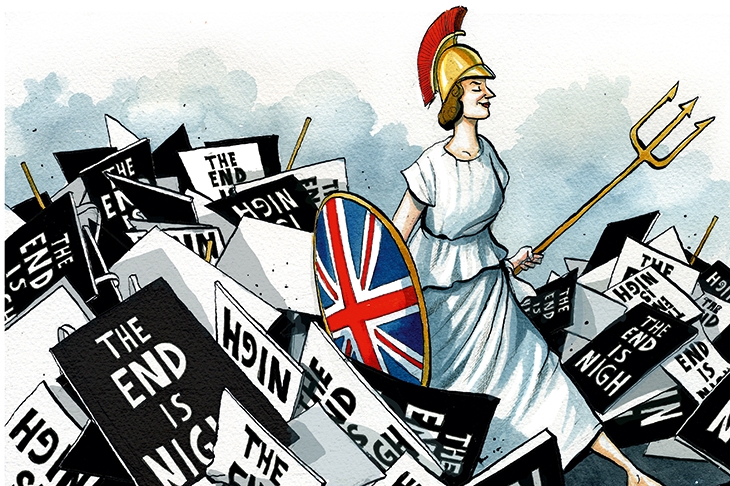On this week’s episode, we talk about the myth of the British decline, theTwelfth of July parades in Northern Ireland, and the regrettable rise of the man hug.
First, Britain seems to be relapsing into another bout of ‘declinism’, writes Professor Robert Tombs in his Spectator cover piece this week. From terror attacks to the Grenfell tower disaster, election upsets to our looming Brexit, the news is being seen by some as a sign of Britain’s downward trajectory in the world. It’s time to snap out of it, says Robert, who joins the podcast along with Fraser Nelson. As Robert writes:
“Britain is more secure from major external threat than for half a millennium. Taking a long view (say the last three centuries) it remains what it always has been — one of the half-dozen or so strongest states in the world, and one of the most global in its attachments, its vision, and its trade. Within this leading group of states, Britain has not declined but has actually advanced, being now more powerful than its ancient rivals France, Germany and Russia. The Cambridge international relations specialist Brendan Simms puts Britain even higher. Taking into account economic and military potential, population, ‘soft power’, diplomatic influence, political resilience and self-determination, he judges it the world’s third great power after the USA and China, and Europe’s only truly independent force.”
In the month since the election, there has been a surge in attention paid to the political situation in Northern Ireland, thanks to Theresa May’s pact with the DUP. In the magazine this week, Jenny McCartney suggests that next week’s Twelfth of July parades will be broadcast to an enraptured British as a sign of Northern Ireland’s continued sectarian issues. But is that really fair? And what do these festivities mean to locals? Jenny joins the podcast, along with Siobhan Fenton in Belfast. As Jenny writes on the huge pyres that mark the festivities:
“Can bonfires be part of cultural expression? Certainly they can. But when they are enormous fires built in unauthorised areas, blazing near housing and belching out poisonous smoke, they are no longer expressions of a culture but of a psychological condition. That condition is one of defiance and despair among working-class Protestants, who feel abandoned by the rest of the UK. Something about the intricate engineering of those pyres, the relentless industry that goes into them, is inherently sorrowful. Once their ancestors employed just such talents in a thriving shipyard that dispatched great vessels all across the world. Now they are directed into piles of ash on scorched earth.”
Meeting and greeting other men used to be so easy, says Matthew Bell in the Spectator this week. Not any more, and it is all the fault of the man-hug. It’s time for someone to lay down the rules on male greetings once and, to do just that, we were joined by etiquette expert Liz Brewer and etiquette amateur Cosmo Landesman. As Matthew writes:
“So now, whenever you meet anyone, you have to make a quick mental calculation of the following factors: their age, how well you know them, how important they are and whether there’s any chance that you might have BO. A judgment is required before you’ve even said hello. So much for the level playing field of the hug. It is not that I don’t like hugging. I do. But I hate an awkward hug. It is worse than no hug at all. If it’s going to happen, you want to get it right, though really I would rather not have to think about it.”










Comments